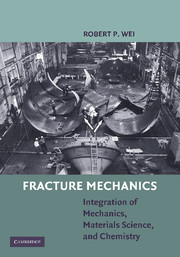Book contents
- Frontmatter
- Contents
- Preface
- Acknowledgments
- 1 Introduction
- 2 Physical Basis of Fracture Mechanics
- 3 Stress Analysis of Cracks
- 4 Experimental Determination of Fracture Toughness
- 5 Fracture Considerations for Design (Safety)
- 6 Subcritical Crack Growth: Creep-Controlled Crack Growth
- 7 Subcritical Crack Growth: Stress Corrosion Cracking and Fatigue Crack Growth (Phenomenology)
- 8 Subcritical Crack Growth: Environmentally Enhanced Crack Growth under Sustained Loads (or Stress Corrosion Cracking)
- 9 Subcritical Crack Growth: Environmentally Assisted Fatigue Crack Growth (or Corrosion Fatigue)
- 10 Science-Based Probability Modeling and Life Cycle Engineering and Management
- APPENDIX: Publications by R. P. Wei and Colleagues
- References
10 - Science-Based Probability Modeling and Life Cycle Engineering and Management
Published online by Cambridge University Press: 05 June 2012
- Frontmatter
- Contents
- Preface
- Acknowledgments
- 1 Introduction
- 2 Physical Basis of Fracture Mechanics
- 3 Stress Analysis of Cracks
- 4 Experimental Determination of Fracture Toughness
- 5 Fracture Considerations for Design (Safety)
- 6 Subcritical Crack Growth: Creep-Controlled Crack Growth
- 7 Subcritical Crack Growth: Stress Corrosion Cracking and Fatigue Crack Growth (Phenomenology)
- 8 Subcritical Crack Growth: Environmentally Enhanced Crack Growth under Sustained Loads (or Stress Corrosion Cracking)
- 9 Subcritical Crack Growth: Environmentally Assisted Fatigue Crack Growth (or Corrosion Fatigue)
- 10 Science-Based Probability Modeling and Life Cycle Engineering and Management
- APPENDIX: Publications by R. P. Wei and Colleagues
- References
Summary
Introduction
Material aging, through the evolution and distribution of damage (e.g., by localized corrosion and corrosion fatigue), is one of the principal causes for the reduction in the reliability and margin of safety of engineered systems. It can contribute significantly to the cost of maintenance and operation and, thereby, the overall life cycle cost. To quantify materials aging and to facilitate the overall optimization of the performance, reliability, and life cycle costs of these systems (i.e., for life cycle engineering and management (LCEM)) new modeling approaches are needed. Traditional (and current) approaches to engineering design are no longer adequate, because these approaches are based largely on the use of experientially based statistical methodologies and accelerated testing over periods that are well short of those of the intended service. The models developed from them are essentially parametric representations of statistical fits to the experimental data, and are effective only over the range of the underlying data. They capture, at best, the influences of the limited number of controlled (external) variables used in testing. Furthermore, variability associated with measurement errors (which cannot be separated from the experimental data) are incorporated into the statistical analyses, and can lead to overestimations of the uncertainty bounds. As such, simple application of known statistical techniques cannot provide the necessary tools for LCEM of engineered systems, and a different approach needs to be adopted.
Information
- Type
- Chapter
- Information
- Fracture MechanicsIntegration of Mechanics, Materials Science and Chemistry, pp. 183 - 198Publisher: Cambridge University PressPrint publication year: 2010
